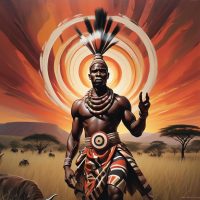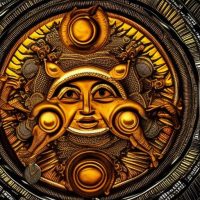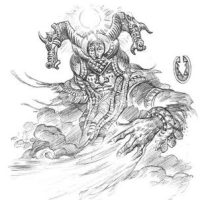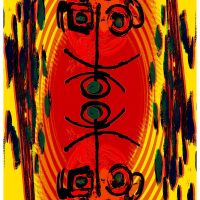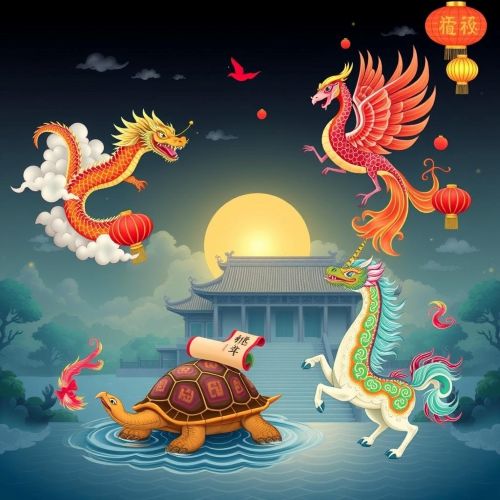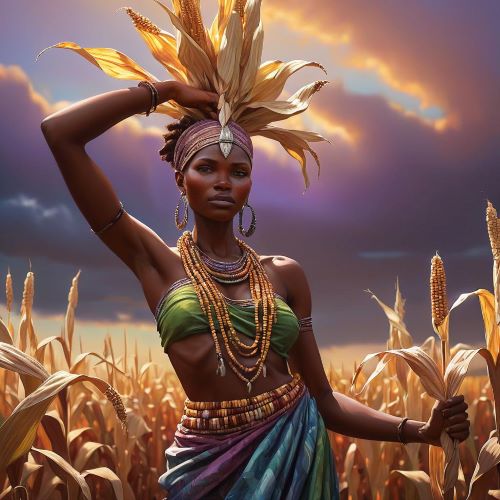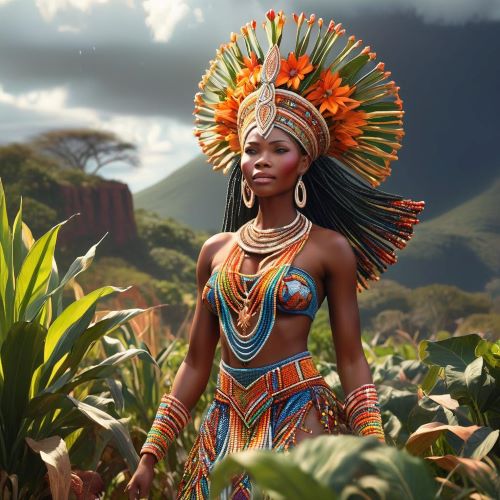Unkulunkulu : The Creator God
Listen
At a glance
| Description | |
|---|---|
| Origin | Zulu Mythology |
| Classification | Gods |
| Family Members | N/A |
| Region | South Africa |
| Associated With | Creation |
Unkulunkulu
Introduction
Within the intricate weave of Zulu mythology, Unkulunkulu emerges as a pivotal figure, celebrated as the progenitor of humanity and the cosmos. The very essence of his name, translating to “the greatest one” or “the very big one,” encapsulates the overarching divinity attributed to him within Zulu cosmology. His origins and actions, veiled in the veils of antiquity, intertwine seamlessly with the cultural ethos of the Zulu people, persisting across epochs through the oral traditions passed down from one generation to the next. Unkulunkulu, a name resonant with enigma and authority, occupies a central position in Zulu lore. His precise nature remains a subject of ongoing discourse, blurring the lines between revered ancestor and supreme creator deity. Rendered as uNkulunkulu in traditional orthography, his significance spans beyond the confines of Zulu mythology, extending to the reverence of neighboring Ndebele and Swati communities.
Unkulunkulu’s existence sparks ongoing discourse within Zulu tradition. In the traditional Zulu belief system, a distinct pantheon was notably absent, yet Unkulunkulu rose to prominence, albeit with interpretations of his role diverging. Some narratives position him as the primal “first man,” the progenitor from whom all humanity descends, while others elevate him to the status of a creator deity, credited with shaping both the world and its inhabitants. The advent of Christianity introduced further complexity, as some missionaries sought to draw parallels between Unkulunkulu and the Christian God, blurring the boundaries between indigenous belief systems and imported religious ideologies.
Physical Traits
Unkulunkulu eludes conventional characterization of physical traits. Initially perceived as an “old-old one” among mythical ancestors, Unkulunkulu’s identity transcended gender, with each tribe and family venerating their own Onkulunkulu with profound reverence. However, as Unkulunkulu’s significance evolved, he surpassed mere human form, embodying the abstract essence of humanity’s ancient origins. Depictions of Unkulunkulu diverge across various narratives and artistic renditions. Some portray him as a towering figure emanating wisdom and power, often depicted with a flowing beard symbolizing age and authority, his eyes aglow with the spark of creation.
Conversely, other representations depict Unkulunkulu as formless and shapeless, transcending mortal concepts of physicality. Unlike many deities characterized by vivid descriptions, Unkulunkulu lacks a distinct physical form, with no traditional depictions in Zulu art or folklore. This absence accentuates his otherworldly essence, existing beyond human comprehension as a conceptual force that birthed creation, rather than a corporeal entity confined by material constraints.
Family
Family holds profound significance in Zulu culture, with Unkulunkulu, the primordial ancestor, occupying the pinnacle of this ancestral lineage. While some narratives suggest a dual origin with a female counterpart named uThlake, the prevailing view presents Unkulunkulu as the sole progenitor from whom all people trace their lineage. The concept of “Onkulunkulu” emerges, representing revered ancestors unique to individual tribes or families, serving as intermediaries between the living and Unkulunkulu, the ultimate ancestor. This ancestral network forms a crucial link, bridging the present to the source of creation. Unkulunkulu’s familial connections are intricately interwoven into Zulu cosmogony, as he is regarded as the progenitor of all living beings.
Mythology depicts him birthing the first man and woman, imbuing them with life and consciousness, and establishing the fundamental principles of kinship and lineage, which underpin the interconnected web of familial ties within Zulu society. While often depicted as a solitary figure, Unkulunkulu’s familial role transcends biological progeny, encompassing all living creatures as his spiritual offspring. In the pre-Christian era, Unkulunkulu featured within a broader ancestral lineage, albeit receiving minimal attention. He was perceived as a solitary, ancient figure—a male creator shaping the destinies of all living beings.
Other names
Beyond the name Unkulunkulu, this divine entity is known by various titles in akin cultures, each reflecting different facets of his essence. These include “uMdali” meaning “Creator,” “uMvelinqandi” translated as “Before everything,” akin to Umvelinqangi in the isiXhosa language, “uThixo” meaning “the Almighty,” “uNqamulekile” signifying his transcendence beyond mortal comprehension, “uGuqabadele” meaning “the irresistible,” emphasizing his irresistible nature, “uGobungqongqo” signifying “he who bends down even majesties,” highlighting his power and majesty, “uKqili” referring to “the wise one,” showcasing his wisdom, and “uMvelinqangi” designating “the first outcomer,” highlighting his primacy.
Each of these epithets adds depth to the multifaceted nature of Unkulunkulu’s divine persona, reflecting both the linguistic richness of Zulu culture and the reverence accorded to this enigmatic figure across different contexts and regions. Unkulunkulu stands adorned with a tapestry of titles, each shedding light on a distinct aspect of his being, from his creative power to his unfathomable wisdom and majesty.
Powers and Abilities
Unkulunkulu, as the source of creation, is believed to wield immense power. He is credited with shaping the world, bringing forth the sun, the moon, and all living beings. Some narratives depict him as a lawgiver, establishing the order of the universe and the principles guiding humanity’s conduct.
Nevertheless, the extent of Unkulunkulu’s involvement in human affairs remains a topic of debate. Unlike deities in other mythologies who frequently intervene, Unkulunkulu is often portrayed as a distant yet formidable figure. He is credited with setting the world in motion but allows humanity a degree of autonomy. Unkulunkulu’s creation story is both mystical and profound. According to Zulu beliefs, he emerged from reeds, a deity of self-origination. From these reeds, he fashioned humans and livestock, proceeding to create the land, water, animals, and the intricate web of existence. His ways remain inscrutable and enigmatic, mirroring the cosmic forces that shape our world.
Endowed with a vast array of powers and abilities befitting his role as the creator and sustainer of the cosmos, Unkulunkulu possesses the ability to shape-shift, assuming various forms to interact with both the mortal realm and divine hierarchy. Through his divine breath, he infuses inert matter with vitality and consciousness, commanding the forces of nature to regulate the cycles of life and death, growth and decay. Additionally, Unkulunkulu wields the power of prophecy, imparting wisdom and guidance to his earthly children through visions and dreams. These abilities underscore his omnipotence and omnipresence, permeating every facet of existence with his divine influence.
Modern Day Influence
With the arrival of Christianity in the mid-1800s, Unkulunkulu experienced a notable transformation, evolving from an ancestral archetype to a creator deity akin to the Christian God. Initially met with hesitation by European missionaries due to its associations with ancestor worship, the name Unkulunkulu was eventually embraced as a means to facilitate the evangelization of the Zulu people. However, debates emerged regarding the literal truth of creation myths, revealing indigenous Africans’ metaphorical interpretations. Despite these shifts, Unkulunkulu’s influence extends beyond traditional Zulu beliefs and continues to resonate in modern-day Zulu culture. His name is frequently invoked in proverbs and traditional tales, serving as a poignant reminder of humanity’s origins and the importance of honoring ancestors.
The concept of a supreme being, even if perceived as less actively involved in daily life, offers a sense of grounding and connection to something greater than oneself. Artists have integrated Unkulunkulu into their works, utilizing him as a symbol of Zulu heritage and cultural identity. His enduring presence solidifies his status as a cornerstone of Zulu mythology, embodying both enigma and awe. Despite the passage of time and the encroachment of modernity, Unkulunkulu continues to wield a profound influence on Zulu culture and spirituality. His mythic narratives persist through oral tradition, transmitted from one generation to the next as a testament to the enduring power of ancestral wisdom.
Moreover, Unkulunkulu serves as a unifying symbol for the Zulu people, fostering a collective sense of identity and cultural pride. In contemporary society, rituals and ceremonies venerating Unkulunkulu remain integral to Zulu religious practices, reaffirming the sacred bond between the earthly realm and the divine cosmos. As custodians of their cultural heritage, the Zulu people look to Unkulunkulu as a guiding light of wisdom and inspiration, guiding them through the complexities of an ever-changing world.
Related Images
Frequently Asked Questions
What is lorem Ipsum?
I am text block. Click edit button to change this text. Lorem ipsum dolor sit amet, consectetur adipiscing elit. Ut elit tellus, luctus nec ullamcorper mattis, pulvinar dapibus leo.
What is lorem Ipsum?
I am text block. Click edit button to change this text. Lorem ipsum dolor sit amet, consectetur adipiscing elit. Ut elit tellus, luctus nec ullamcorper mattis, pulvinar dapibus leo.
What is lorem Ipsum?
I am text block. Click edit button to change this text. Lorem ipsum dolor sit amet, consectetur adipiscing elit. Ut elit tellus, luctus nec ullamcorper mattis, pulvinar dapibus leo.
What is lorem Ipsum?
I am text block. Click edit button to change this text. Lorem ipsum dolor sit amet, consectetur adipiscing elit. Ut elit tellus, luctus nec ullamcorper mattis, pulvinar dapibus leo.
What is lorem Ipsum?
I am text block. Click edit button to change this text. Lorem ipsum dolor sit amet, consectetur adipiscing elit. Ut elit tellus, luctus nec ullamcorper mattis, pulvinar dapibus leo.

